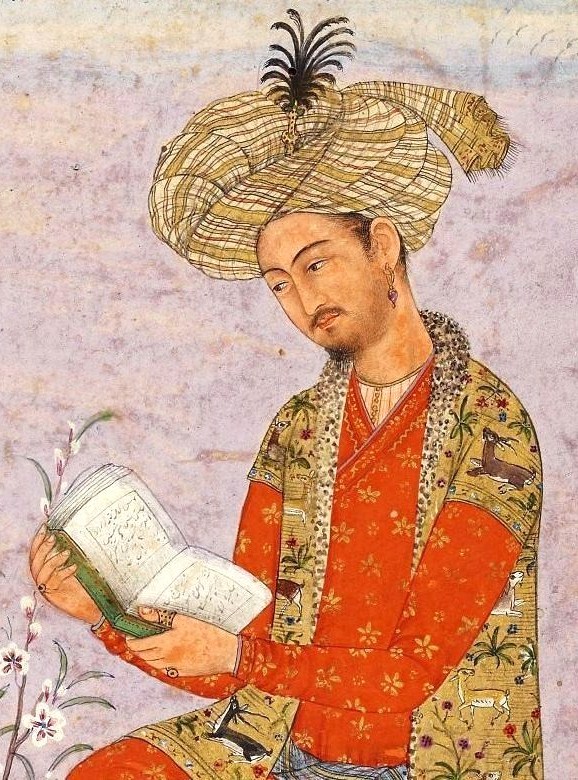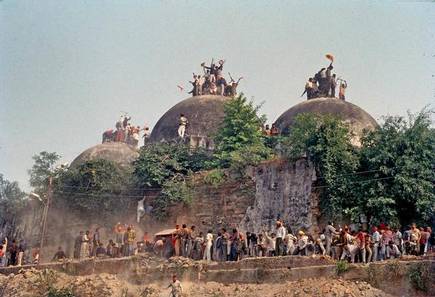Synopsis : The Supreme Court of India made a land mark decision yesterday when it decided that the Babri Masjid in Ayodhya was illegally built on the foundation of a Hindu temple of Ram several centuries ago under the rule of Mughal emperor Babar so the Hindus are now free to build their temple there and the Moslems will be given 5 acres of land to build their mosque elsewhere. A fair and equitable decision by the court has put to rest a contentious issue that had plagued India for so long proving that a fair decision is possible in all disputes.

Source : Google photo of Babar who established Moghul empire in India
Yesterday was November 9, 2019 when a landmark decision was made in the Supreme Court of India where all the judges unanimously decided that a wonderful temple to honor the Hindu God Ram will be built at the site where a mosque had been built by Babar some 400 years ago. People in India were not surprised at this decision that was judged fair and impartial but took notice of how long it took for the court to decide on the issue that has been a bone of contention between the Hindus and the Moslems since a very long time.
Babar (1526-1530): the great grandson of Tamerlane and Genghis Khan, was the first Moghul emperor in India. He confronted and defeated Lodhi in 1526 at the first battle of Panipat, and so came to establish the Moghul Empire in India. Babar ruled until 1530, and was succeeded by his son Humayun. ( Wikipedia).
It was a sad end to an empire that lasted over 400 years that stretched from Afghanistan to Burma at its zenith that laid a permanent imprint on India and a lasting legacy of bloodshed, cruelty and religious intolerance espoused by various Moghul kings starting with Babar who established a mosque in Ayodhya on the foundation of a majestic Hindu temple. It did not stop there. His successors to the throne went on to destroy thousands of Hindu temples throughout India to build mosques there but the Babri masjid or the mosque of Babar in Ayodhya is the most notable because it pierced the heart of Hindu India that venerates Ram as their god and Ayodhya his birth place. Please read my blog called the Religious intolerance here.
So one day in 1992, thousands of Hindu devotees of Ram gathered in Ayodhya to demolish the mosque so that a Ram temple could be built there. They literally tore the mosque down with their bare hands that angered some Moslems who were incited by their mollahs resulting in a clash that took hundreds of lives of Hindus and Moslems.
When a train load of devotees of Ram were returning to Gujarat one day, the train was attacked and burned by the Moslems so hundreds of pilgrims were burned to death that resulted in swift reprisals by Hindus on Moslem causing more bloodshed. The tragedy of interfaith animosity continued that has brought shame and anger on both sides that never seems to end in India until the Supreme Court stepped in and ended it yesterday.
India is known for its religious tolerance of other faiths so it was a Hindu King in Kerala who built the first mosque in India hundreds of years ago when Moslems were very few in numbers and were trying to get a foothold but later Moghul kings turned out to be more intolerant and went of a rampage of destruction of Hindu places of worship on a wholesale basis and put to sword the Hindus who refused to convert to Islam.
This was the seed of hatred the Moghul kings sowed that flourished under their long rule over the majority Hindus that suffered heavily with no recourse to justice. Only Akber tried to bring the two faiths together and started a new religious movement called Deen Ilahi that took the best of both religions and forced the hard line mollahs into exile but his liberal stance did not sit well with the mollahs so they continued to protest and got the upper hand after the death of Akber when the latent animosity rose up again.
Aurangjeb who succeeded after Shah Jehan was known for his fundamentalist fervor of spreading Islam so his rule saw the wholesale destruction of temples and forced conversion of Hindus to Islam. Today the Moslems in India number in millions and growing at a fast rate but they ignore the fact that they were all Hindus before they became Moslems willingly or unwillingly creating a new problem for India called Pakistan.
By and large the Moslems get along well with the Hindus in India and have welcomed the fair decision of the Supreme Court yesterday by saying that it was wrong to demolish a Hindu temple of Ram and build a mosque there. They are to be given 5 acres of land elsewhere to build a mosques so both parties are satisfied but the mollahs are different.
By agreeing to the verdict of the Supreme court, the vast majority of the Moslems in India repudiate the mollahs and their hard line stance because they now say that the mollahs do not represent them. Most of the Moslem population suffers from poverty, unemployment, lack of education and decent housing so they remain mired in poverty even after seventy years of independence so a mosque is not their main problem.
The mollahs had promulgated Triple Talaq law on the Moslem women that was recently overturned by the Supreme Court because it violated the basic rights of women but there are numerous other such illegal practices the mollahs have forced upon the Moslem women in particular that are now under scrutiny and may be over turned by the Supreme Court in the future thus paving the way for their emancipation and progress. Moslems welcome the repeal of the Triple Talaq because their mothers, sisters and relatives have long suffered under this cruel law imposed on them by the mollahs. Any Moslem man could divorce his wife by saying Talaq three times leaving the woman destitute but no more. This cruel law has been repealed in India.
So it is not surprising that the Moslems welcome the progress the government is making to make their life better so they have shown great support for the court's decision yesterday although there will always be those who do not agree. Most Hindus and Moslems see it as a step forward to make a harmonious society where everyone lives peacefully respecting each other's faith and beliefs. This is the dream of new India where the progress for everyone, with everyone together with their support is the priority. The new mantra is Nation first and personal differences second which has begun to resonate throughout the country.
If India can overcome such a sensitive issue as the Babri Masjid in a manner that is fair and largely acceptable to all then why can't the Jews and the Moslems in Jerusalem? When Saladin built a mosque at the temple mount there , he destroyed the great Jewish temple there to do so that created the chasm between the Jews and the Moslems that seems to get wider over the centuries because they too want their temple to be restored but they can't agree on a peaceful solution like the Apex court of India gave yesterday.

Source : Google photo of mosque on the temple mount in Jerusalem
The Jews have not given up hope and collected stones to rebuild their temple there someday but when will it happen? How many centuries more they have to wait until a peaceful solution is reached? Why Saladin had to destroy the temple to build his mosque when he could have built it somewhere else? Is there or was there any shortage of land or a suitable site centuries ago? The Jews will give them land and even help in building a new mosque in Jerusalem if only the Moslems agree but again the mollahs are putting up the road blocks to a peaceful settlement.
The rebuilding of their promised temple on the mount in Jerusalem will build the bridge of friendship and end all hostilities forever between them and the Moslems but it seems impossible or is it? Is anything impossible if there is a will and good intention? Didn't Anwar Sadat end the hostility between Egypt and Israel by taking the bold step of friendship? If India with it's long history of animosity and bloodshed can come to a peaceful solution then why can't others? It is definitely something to think about.
Recently the Kartarpur corridor was opened in Pakistan to allow Indian Sikh pilgrims to visit their most sacred temple ( called Gurudwara ) in Pakistan for the first time in 70 years since independence. It is perhaps not a coincidence that the Kartarpur corridor opening and the Supreme Court's decision on Ayodhya both came on the same day signifying that religious differences can be overcome if there is a will. Pakistan has shown openness and generosity in making the corridor for all Sikhs to visit their shrine paving the way for the resolution of all issues between the two countries.
War and bloodshed is not the solution but understanding the issues and taking a constructive and bold approach is what makes everyone a winner. The whole world condemns with one voice the rise of fundamentalism of terrorists and made elimination of them a priority starting with the ISIS leader recently. Terrorism and killing of innocent people by anyone is not condoned by any religion but twisted people use religion as their basis for their cruelty.
Today the main challenges are not building more mosques and forcing people to become Moslem but elimination of poverty, creating more jobs for the poor, good affordable housing for all, education, better health care coverage for the poor, electricity and potable water and so on. A society based on religious freedom, fair and equal justice for all and tolerance makes progress. The Ayodhya decision is an eye opener that shows that anything is possible if a society sticks to the rule of fair law and justice.
But the justice will be complete when all the relatives of people who died in 1992 will be fairly compensated by the government and their names to be inscribed in stone in the new temple that will soon rise in Ayodhya to make people remember that great sacrifices were made here by Hindus and Moslems.
Note : My blogs are also available in French, Spanish, German and Japanese languages at the following links as well as my biography:
Mes blogs en français.
Mis blogs en espagnol
Blogs von Anil in Deutschn
Blogs in Japanese
My blogs at Wix site
tumblr posts
Blogger.com
Medium.com
Anil’s biography in English.
Biographie d'Anil en français
La biografía de anil en español.
Anil's Biografie auf Deutsch
Anil’s biography in Japanese
Биография Анила по-русскиu

No comments:
Post a Comment